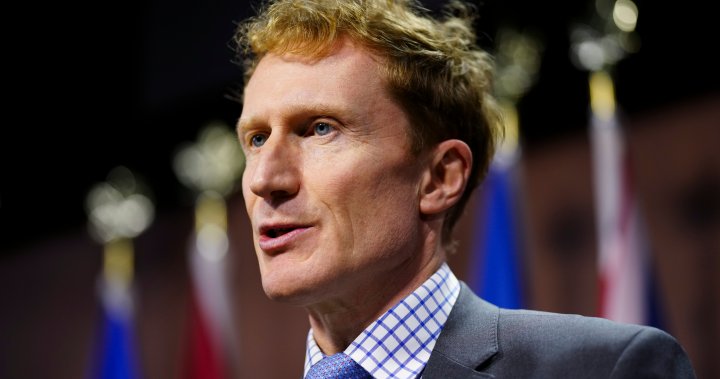Mexican citizens will once again need a visa to come to Canada after asylum claims from that country have soared in recent years.
Immigration Minister Marc Miller made the announcement Thursday morning in Ottawa, saying the change will take effect as of 11:30 p.m. Eastern.
“We have seen exponential growth in claims from Mexican nationals particularly in the last year,” said Miller at a news conference Thursday. “Measures had to be taken.”
Asylum claims from Mexico reached a record high last year, but more than 60 per cent were either rejected or withdrawn.

“I don’t want to deny the right of someone to allege that they are fleeing violence and oppression,” Miller told reporters. “When you see those numbers, you see we have role to play in adjusting the volume.”
“You start scratching your head and saying ‘increasing volume, low success rate,’ there’s a problem that has nothing to do with the IRB (Immigration and Refugee Board) and an independent judicial process and the government then has a right and a duty to take action.”
Data from Immigration, Refugees and Citizenship Canada shows the number of asylum claims from Mexico increased more than 22,600 per cent since the year the Liberals were elected in 2015, to 25,236 in 2023 from 111 in 2015 in 2023 — the highest number of claims from any country last year.

The backlog of claims from Mexico currently sits at over 28,000, according to the department.
Breaking news from Canada and around the world
sent to your email, as it happens.
The Harper government first imposed the visa requirement in 2009. But the Liberals reversed it in 2016, making it easier for Mexican nationals to make asylum claims in Canada.
Conservative Leader Pierre Poilievre said the requirement “never should have been lifted” in the first place and linked the surging asylum claims to pressures on health care and housing.

“We have the social services and our housing market completely overwhelmed with false claimants,” said Poilievre, after Thursday’s announcement.
Miller acknowledge the influx is adding pressure to the housing supply but said it’s specific to “one area; affordable, low-income housing.”
The changes to visa requirements will not apply to Mexicans who hold a valid work or student permits.
Mexican citizens will need an entry requirement known as an electronic travel authorization (ETA) if they hold a valid U.S. non-immigrant visa or have had a Canadian visa in the past ten years and are travelling by plane.
The Quebec government had told Global News on Wednesday night that it had been informed by Ottawa that the federal government plans to bring back visa requirements for Mexican nationals, something Premier Francois Legault has been pushing for to curb the rising number of asylum seekers to the province.
In that statement to Global News, spokesperson for Quebec’s ministry of immigration, Maude Méthot-Faniel, said in French this is an important step forward, but will not solve everything.
She added Quebec takes in half of all asylum seekers in Canada and of these, 25 per cent are Mexican nationals.
Legault cited the steep rise in Mexican asylum claimants since then in a letter to Prime Minister Justin Trudeau last month, warning that his province’s services for refugees are reaching a “breaking point.”
But while Quebec is welcoming the visa reinstatement, the Mexican government is not.
In a statement Thursday, Mexico’s Foreign Affairs Ministry said, “Mexico regrets this decision and believes that there were other options available before putting this measure in place,” adding “Mexico reserves the right to act in reciprocity.”
While at a press conference a day earlier, Mexican President Andrés Manuel López Obrador said Canada was on the verge of applying “unilateral measures” on Mexico to control immigration, on which he said his administration has always cooperated.
Miller said discussions have been underway for months and disagreed with the Mexican president’s characterization that Canada’s decision was made “unilaterally.”
“This is not something that happens in secret,” added Miller.
López Obrador threatened to skip the upcoming North American Leaders or “Three Amigos” summit, set to take place in Canada later this year, if he feels Mexico isn’t getting “respectful treatment” on immigration and other issues from Canada and the U.S.
© 2024 Global News, a division of Corus Entertainment Inc.










